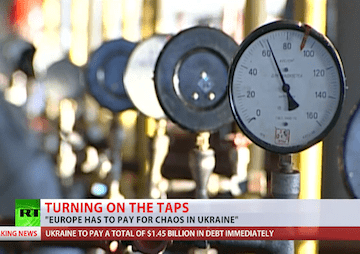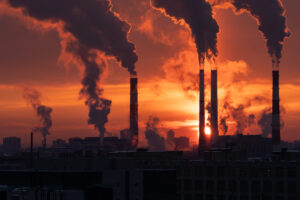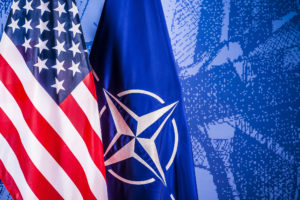Russia-Ukraine Gas Deal Comes at a Price (Updated)
Aid from the International Monetary Fund will enable Ukraine to pay billions in debt to Russia's primary gas company and free up enough of Ukraine's budget to allow the country to buy fuel through the winter. But the IMF deal entails major reforms to the country's energy industry. Image by RT
Image by RT
Image by RT
Aid from the International Monetary Fund will enable Ukraine to pay billions in debt to Russia’s primary gas company and allow Ukraine to buy fuel through the winter. But the IMF deal entails major reforms to the country’s energy industry.
The details of those reforms were not disclosed in an article published in the Financial Times on Oct. 30. But it seems safe to assume they would involve regulations that are beneficial to Western financial interests.
The Financial Times reported:
Russia has secured an 11th-hour deal to resume gas exports to Ukraine, allaying concerns that Europe would face an energy crisis this winter. Moscow severed gas exports to Kiev in June amid a payment dispute that has been overshadowed by a conflict between Ukraine’s army and pro-Russian militias in the east of the country.
For months, EU-mediated negotiations to restart gas flows have made no progress and European diplomats viewed the end of October as a deadline for a deal. With temperatures in Kiev dropping below freezing, fears have grown that a supply crunch in Ukraine would disrupt energy exports to the rest of Europe.
But after 30 hours of negotiations in Brussels, Moscow signed a deal with Kiev to guarantee supplies until March. “There is now no reason for people in Europe to stay cold this winter,” said José Manuel Barroso, president of the European Commission.
Russian Energy Minister Alexander Novak said Moscow made the “compromise” to show that it could be relied upon as a commercial partner of the European Union. Disruption of Russian gas into Ukraine this winter would have risked the possibility of supplies failing to reach the EU, as happened in 2006 and 2009. Roughly 30 percent of Europe’s gas comes from the Russian company Gazprom, half of it flowing through Ukraine.
Below, University of Missouri economist Michael Hudson talks with RT about how the deal figures into international game-playing. A transcript of his full remarks, provided by RT, appears after the clip.
RTQuestionMore:
RT: How important is this gas deal for Ukraine and for Europe?
Michael Hudson: It’s apparently most important for Europe because it was Europe that gave in on the deal. The problem was never about the price of the Russian gas. The problem was whether Ukraine was doing to keep up trying just to run up a larger and larger gas bill every month and every year and finally default. In the US Treasury, strategists have already discussed in public how Ukraine can simply avoid paying Russia the money that it owed by going to court and stalling it. So Russia understandably said, “We need credit in advance.” Mr. Oettinger of the European Commission said “Wait a minute, Russia, why don’t you just lend them the money. They will repay you.” And Mr. Putin at the Valdai Club speech in Sochi last week made it very clear. Look, [Russia] has already lent them 11 billion dollars, much more than anyone else has lent to Ukraine. Ukraine is bankrupt, it’s torn itself apart. Why didn’t perhaps a European Bank underwrite the loan? Finally, Mr. Oettinger gave in. Europe said “OK, the IMF is going to lend Ukraine the money to pay Russia for the gas for the balance of the year.” So that Ukraine would end up owing the IMF money and the European Commission money, not Russia. So Russia will not be exposed to having to lend any more money to a dead-beat economy.
RT: You think that it was the EU who gave in on that deal and not Ukraine or Russia. Why?
MH: Ukraine has passed. Ukraine said “We are broken, we don’t have any money, we have spent all our money on war. Our export industry is collapsing. If we need gas, we’ll simply steal the gas that Russia is sending to Europe. We are not going to starve – we’ll just take your gas.” And Putin said, “Well, if they try to steal gas like they did a few years ago, we’ll just turn off the gas and Europe won’t get gas”. So Europe realized that it wouldn’t get the gas if it didn’t step behind Ukraine and all of a sudden Europe is having to pay for Ukraine’s war against Russia. Europe is having to pay for the whole mess in Ukraine so that it can get gas, and this is not how they expected it to turn out.
RT: Do you think this deal will improve relations between Europe and Russia?
MH: Europe is very uncomfortable with being pressured by the US that essentially said “Let’s you and Russia fight.” Europe is already suffering. Germany has always been turning towards Russia, all the way. 50 years ago, I remember Konrad Adenauer in Germany always spoke very pro-Western and pro-American, but always turned economically towards Russia. So of course Europe, and Germany especially, has wanted to maintain its ties with Russia. The problem is the US [wants] to start a new Cold War. It created a lot of resentment in Europe, and Europe is finally capitulating. This means that the US pressure to set Europe against Russia has failed.
RT: Could we expect now easing of sanctions on Russia?
MH: No, Europe is still being pressured, the sanctions are pressured by NATO, and NATO is pressing for a military confrontation with Russia. The sanctions are going to continue unless Russia gives back Crimea, which of course it won’t. The sanctions are hurting Europe, they are turning out to be a great benefit for Russia because finally Russia is realizing: “We can’t depend on other countries to supply our basic imports, we have to rebuild our industry.” And the sanctions are enabling Russia to give subsidies to its industry and agriculture that it couldn’t otherwise do. So Russia loves the sanctions, Europe is suffering and the Americans are finding that the Europeans are suddenly more angry at it than they are at Russia.
Update 11/1: Here is a further remark by Hudson posted in the comments section of Naked Capitalism’s treatment of the RT video:
Russian agricultural output is up sharply — mainly at the expense of the Baltics and other gung-ho NATO supporters. Food was the easiest commodity for Russia to produce, and will now build up its agriculture towards European standards. sanctions spur self-sufficiency, as in times of war (viz. English agricultural output during the Napoleonic Wars and blockade)
Manufacturing needs protectionism, and NATO threats show Russia the need to achieve self-sufficiency in basic needs. So the sanctions will work as a catalyst. As for the temporary hardship they cost, this seems to be galvanizing the Russian population, much as civilian bombing does in warfare (or 9/11 did in the US).
— Posted by Alexander Reed Kelly.
Your support matters…Independent journalism is under threat and overshadowed by heavily funded mainstream media.
You can help level the playing field. Become a member.
Your tax-deductible contribution keeps us digging beneath the headlines to give you thought-provoking, investigative reporting and analysis that unearths what's really happening- without compromise.
Give today to support our courageous, independent journalists.




You need to be a supporter to comment.
There are currently no responses to this article.
Be the first to respond.